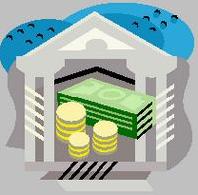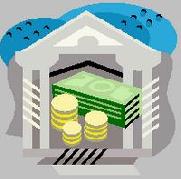
 |
|
| Financial Terms | |
| Money |
|
Information about financial, finance, business, accounting, payroll, inventory, investment, money, inventory control, stock trading, financial advisor, tax advisor, credit.
Main Page: investment, inventory control, credit, accounting, business, inventory, finance, stock trading, Also see related: financing, condo, insurance, real estate, first time homebuyer, buy home, credit, homebuyer, home insurance, |
Definition of Money
MoneyAny item that serves as a medium of exchange, a store of value, and a unit of account. See medium of exchange.
Related Terms:At-the-moneyAn option is at-the-money if the strike price of the option is equal to the market price of the Call money rateAlso called the broker loan rate , the interest rate that banks charge brokers to finance Hot moneymoney that moves across country borders in response to interest rate differences and that moves In-the-moneyA put option that has a strike price higher than the underlying futures price, or a call option Money baseComposed of currency and coins outside the banking system plus liabilities to the deposit money banks. Money center banksBanks that raise most of their funds from the domestic and international money markets, relying less on depositors for funds. Money managementRelated: Investment management.  Money managerRelated: Investment manager. Money marketmoney markets are for borrowing and lending money for three years or less. The securities in Money market demand accountAn account that pays interest based on short-term interest rates. Money market fundA mutual fund that invests only in short term securities, such as bankers' acceptances, Money market hedgeThe use of borrowing and lending transactions in foreign currencies to lock in the Money market notesPublicly traded issues that may be collateralized by mortgages and MBSs. Money purchase planA defined benefit contribution plan in which the participant contributes some part and Money rate of returnAnnual money return as a percentage of asset value. Money supplyM1-A: Currency plus demand deposits  New moneyIn a Treasury auction, the amount by which the par value of the securities offered exceeds that of Out-of-the-money optionA call option is out-of-the-money if the strike price is greater than the market price Precautionary demand (for money)The need to meet unexpected or extraordinary contingencies with a Speculative demand (for money)The need for cash to take advantage of investment opportunities that may arise. Time value of moneyThe idea that a dollar today is worth more than a dollar in the future, because the dollar Transaction demand (for money)The need to accommodate a firm's expected cash transactions. Money MarketA market that specializes in trading short-term, low-risk, very liquid money marketMarket for short-term financial assets. High-Powered MoneySee money base. Money BaseCash plus deposits of the commercial banks with the central bank. Money MarketA financial market in which short-term (maturity of less than a year) debt instruments such as bonds are traded. Money MultiplierChange in the money supply per change in the money base. Money Rate of InterestSee interest rate, nominal. Neutrality of MoneyThe doctrine that the money supply affects only the price level, with no long-run impact on real variables. Printing MoneySale of bonds by the government to the central bank. Quantity Theory of MoneyTheory that velocity is constant, and so a change in money supply will change nominal income by the same percentage. Formalized by the equation Mv = PQ. Real Money Supplymoney supply expressed in base-year dollars, calculated by dividing the money supply by a price index. Fiat MoneyFiat money is paper currency made legal tender by law or fiat. It is not backed by gold or silver and is not necessarily redeemable in coin. This practice has had widespread use for about the last 70 years. If governments produce too much of it, there is a loss of confidence. Even so, governments print it routinely when they need it. The value of fiat money is dependent upon the performance of the economy of the country which issued it. Canada's currency falls into this category. Money LaunderingThis is the process by which "dirty money" generated by criminal activities is converted through legitimate businesses into assets that cannot be easily traced back to their illegal origins. Money MarketFinancial market in which funds are borrowed or lent for short periods. (The money market is distinguished from the capital market, which is the market for long term funds.) money market fundA type of mutual fund that invests primarily in short-term debt securities maturing in one year or less. These include treasury bills, bankers’ acceptances, commercial paper, discount notes and guaranteed investment certficates. money orderA guaranteed form of payment in amounts up to and including $5,000. You might request a money order in order to pay for tuition fees at a university or a college, or for a magazine subscription. Accounts payablemoney owed to suppliers. Accounts receivablemoney owed by customers. After-tax real rate of returnmoney after-tax rate of return minus the inflation rate. BaneIn the words of Warren Buffet, Bill Bane Sr., is, "a great American and one of the last real traders Banker's acceptanceA short-term credit investment created by a non-financial firm and guaranteed by a BARRA's performance analysis (PERFAN)A method developed by BARRA, a consulting firm in BondBonds are debt and are issued for a period of more than one year. The U.S. government, local BorrowTo obtain or receive money on loan with the promise or understanding that it will be repaid. Broker loan rateRelated: Call money rate. Bull spreadA spread strategy in which an investor buys an out-of-the-money put option, financing it by BuyoutPurchase of a controlling interest (or percent of shares) of a company's stock. A leveraged buy-out is Buy-side analystA financial analyst employed by a non-brokerage firm, typically one of the larger money Capitalmoney invested in a firm. Cash management billVery short maturity bills that the Treasury occasionally sells because its cash Certificate of deposit (CD)Also called a time deposit, this is a certificate issued by a bank or thrift that Claim dilutionA reduction in the likelihood one or more of the firm's claimants will be fully repaid, Comparison universeThe collection of money managers of similar investment style used for assessing CompoundingThe process of accumulating the time value of money forward in time. For example, interest Contingent immunizationAn arrangement in which the money manager pursues an active bond portfolio Continuous compoundingThe process of accumulating the time value of money forward in time on a Cost of fundsInterest rate associated with borrowing money. Covered PutA put option position in which the option writer also is short the corresponding stock or has Creditmoney loaned. CreditorLender of money. Currencymoney. Currency arbitrageTaking advantage of divergences in exchange rates in different money markets by Dealer loanOvernight, collateralized loan made to a dealer financing his position by borrowing from a Debtmoney borrowed. Debt leverageThe amplification of the return earned on equity when an investment or firm is financed Discount securitiesNon-interest-bearing money market instruments that are issued at a discount and Discrete compoundingCompounding the time value of money for discrete time intervals. Dividend policyAn established guide for the firm to determine the amount of money it will pay as dividends. Effective annual interest rateAn annual measure of the time value of money that fully reflects the effects of Effective rateA measure of the time value of money that fully reflects the effects of compounding. Eurocurrency marketThe money market for borrowing and lending currencies that are held in the form of Euro-commercial paperShort-term notes with maturities up to 360 days that are issued by companies in Evaluation periodThe time interval over which a money manager's performance is evaluated. Exercise valueThe amount of advantage over a current market transaction provided by an in-the-money Fiatmoney Nonconvertible paper money. Figuring the tailCalculating the yield at which a future money market (one available some period hence) is Fixed-annuitiesAnnuity contracts in which the insurance company or issuing financial institution pays a Foreign currencyForeign money. Friction costsCosts, both implied and direct, associated with a transaction. Such costs include time, effort, FrictionsThe "stickiness" in making transactions; the total hassle including time, effort, money, and tax Futures commission merchantA firm or person engaged in soliciting or accepting and handling orders for Growth managerA money manager who seeks to buy stocks that are typically selling at relatively high P/E Growth stockCommon stock of a company that has an opportunity to invest money and earn more than the InstrumentsFinancial securities, such as money market instruments or capital market insturments. InterestThe price paid for borrowing money. It is expressed as a percentage rate over a period of time and Interest on interestInterest earned on reinvestment of each interest payment on money invested. Intrinsic value of an optionThe amount by which an option is in-the-money. An option which is not in-themoney Investment incomeThe revenue from a portfolio of invested assets. Investment managerAlso called a portfolio manager and money manager, the individual who manages a IRA/Keogh accountsSpecial accounts where you can save and invest, and the taxes are deferred until money Irrational call optionThe implied call imbedded in the MBS. Identified as irrational because the call is Jensen indexAn index that uses the capital asset pricing model to determine whether a money manager LendTo provide money temporarily on the condition that it or its equivalent will be returned, often with an Lookback optionAn option that allows the buyer to choose as the option strike price any price of the Maintenance margin requirementA sum, usually smaller than -but part of the original margin, which must MarginThis allows investors to buy securities by borrowing money from a broker. The margin is the Market pricesThe amount of money that a willing buyer pays to acquire something from a willing seller, Related to : financial, finance, business, accounting, payroll, inventory, investment, money, inventory control, stock trading, financial advisor, tax advisor, credit. |